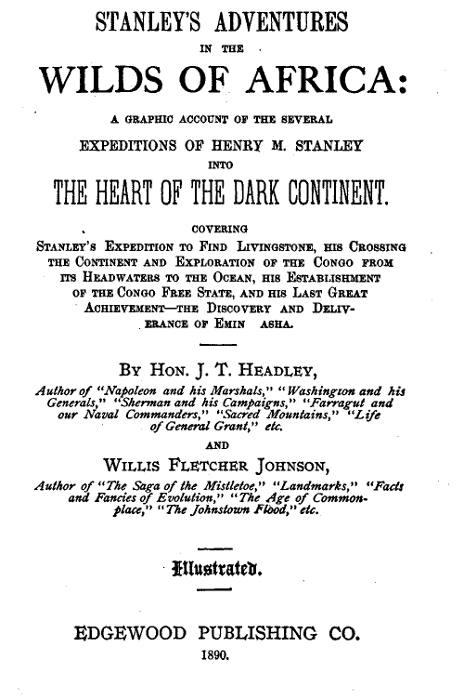E-text prepared by Juliet Sutherland, Martin Pettit,
and the Online Distributed Proofreading Team
()
STANLEY'S ADVENTURES
IN THE
WILDS OF AFRICA by J. T. Headley
and
W. F. Johnson
HENRY M. STANLEY.

Entered According to Act of Congress, in the year 1890,
By WALTER J. BROOKS,
In the Office of the Librarian of Congress at Washington, D.C.
STANLEY'S
Wonderful Adventures
IN
"THE DARK CONTINENT."
PREFACE.
For centuries Africa has been "the dark continent" of our globe. Thesea-washed edges of this immense tract have been known time immemorial.Egypt, at its northeastern corner, is the oldest of the governments ofthe earth; while the nations skirting the Red and the Mediterranean seaswere actors in the earliest recorded history. But Africa as a whole hasbeen an unknown land.
That it was a fertile land, was demonstrated by the treasures broughtfrom its depths by those mighty rivers, the Nile, the Niger and theCongo. That it was populous, was proven by the fact that its nativetribes had furnished to the world without, forty millions of slaves inthe period of two centuries. Both the slave-hunter and the slave toldwondrous tales of the inner depths of the land, but these were merehints as to the actual facts of the case. Africa remained a mystery anda riddle, that seemingly were never to be penetrated.
For many years explorations in Africa were made simply to gratifycuriosity, or from a desire to penetrate beyond lines reached by othermen. All the results desired or expected were amusement or fame. But inlater years African explorations have assumed an entirely differentaspect. From Livingstone, who first began to open up "the darkcontinent," to Cameron and Stanley who pierced its very heart, allexplorations have tended to one great end—the civilization andChristianization of the vast population that inhabits it. No[Pg viii] matterwhat the ruling motive may have been in each case, whether, as inLivingstone, to introduce Christianity; or, in Baker, to put a stop tothe slave trade; or, in Stanley, to unlock the mystery of ages, stillthe tendency has been the same: to bring Africa into the family ofcontinents instead of being the earth's "pariah;" to throw light on thisblack spot of our planet, and make those who inhabit it practically andmorally, what they are really, a portion of the human race.
Mungo Park, Denham and Clapperton made explorations of considerablevalue early in the present century, but Livingstone with thirty years oftoil in Africa was the real pioneer of successful work. In 1840, at theage of twenty-five, he embarked as a missionary to South Africa, thusentering the land where he lived and died, and which he never left saveon two brief visits to his native land.
After Livingstone's last return t
